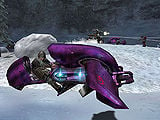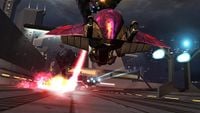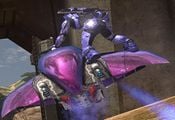Karo'etba-pattern Ghost
From Halopedia, the Halo wiki
Template:Ratings Template:Ship The Type-32 Rapid Assault Vehicle (abbreviated Type-32 RAV), otherwise known as the Ghost (by the UNSC), is the Covenant's standard reconnaissance and rapid attack vehicle. It is equipped with two of what are now accepted as the standard light vehicle mounted weapons: a directed energy weapon capable of projecting a bolt of super-heated plasma in the 100-250 kW range. It was first seen in Halo: Combat Evolved as one of two drivable Covenant vehicles, along with the Banshee.
Overview
The Ghost is a simple single-pilot recon and assault vehicle, and is essentially the equivalent of the UNSC Mongoose, although it has much more offensive and defensive power compared with the latter. It boasts a streamlined design and make-up concept to optimize speed and agility, and two wing-like structures on either side for maneuverability. It hovers off the ground using Covenant anti-gravity technology, and features a boost and two plasma cannons. It can accelerate very rapidly, and reach speeds of up to 60 kilometres per hour, and 90 kilometers per hour when using the boost. However, when using the boost function, a Ghost's plasma bolts cannot be fired, possibly due to the fact that the vehicle will draw power from the weapons to overcharge the engine, which can be bad in some situations. It has been observed that the Ghost seems to have a near infinite supply of power known to be power by a variant of plasma that possibly goes through an energy recycling feature like the modern re-breather apparatus. The Ghost is used by the Covenant for a number of different purposes, such as patrolling large areas in short amount of time, or hit and run attacks. The Ghost can be deployed almost anywhere and can follow Covenant ground troops with ease. They fact that they can be deployed quickly and in greater numbers than the Wraith makes them advantageous in combat. Ghosts were mainly piloted by Elites, though when they separated Heavy Grunts began to pilot Ghosts. Brutes, preferring their own technology, pilot the Chopper and Prowler, but they also pilot Ghosts given the chance.
Propulsion
A Ghost is propelled by a form of anti-gravity engine known as a Boosted Gravity Propulsion Drive, allowing the Ghost to skim above the ground while it is activated. This drive is visible as a bright, fluorescent area of blue energy emanating from the underside of the Ghost. Each "wing" of the Ghost contains a vent that disperses excess heat, most obviously demonstrated by a bright purple glow when the Ghost is boosting.
Later Ghosts have modified engines, possessing a speed boost feature that increases it's top speed to 90kph, allowing for periods of greater velocity but compromised maneuverability. This allows Ghost pilots to enter and leave combat zones rapidly, kill enemies by running them down, or "splattering" them, and evade more durable foes. As a trade-off, a Ghost's energy reserves are drained rapidly in this mode, and its energy weapons are disabled.[1] In Halo 3, this energy boost can still be used for as long as wanted, but stops when the pilot crashes. Judicious use of the speed boost can help prevent a Ghost from flipping over after skipping over a boulder or other obstacle.
The Ghost hovers low above the ground, usually between one and two meters up. In Halo: Combat Evolved, the Ghost floated high enough that it could not be jumped over and low enough that it could not be crouched under. This made it uniquely dangerous to infantry, but it is actually quite hard to make a road kill. In Halo 2 the Ghost moved lower along the ground, less then a meter up, so that it could be jumped over. Its ability to kill enemies on impact was also severely reduced; a direct hit with the boost engaged will not always kill the opponent, but most likely will kill grunts and jackals outright but brutes sometimes survive. Indeed, it may send them flying wildly away, saving their life.
The Ghost also has the ability to briefly pull its nose upwards, allowing it to avoid impacting small obstacles, as well as stay level while falling or flipping over. This ability, known as "doing a wheelie," is far more pronounced at higher speeds, especially when the boost is active.
Strengths
The vehicle's light weight and great speed make it one of the most agile vehicles in the Halo series. Its ability to stop or accelerate rapidly, as well as its capacity for lateral motion, make it adept at avoiding all but the fastest-moving projectiles. The boost feature is not only excellent for entering and exiting combat zones in relative safety, and can also turn the vehicle itself into a weapon due to its ability to "splatter" infantry. Its plasma cannons are extremely effective against light vehicles and infantry, and even if the vehicle is disabled, they can still be used to devastating effect. Ghosts can be transported to and from the battlefield by a variety of craft, such as Spirits, Phantoms, and Shadows with relative quickness. They allow great tactical flexibility for Covenant ground force commanders as fast, hard-hitting vehicles to harass enemy infantry formations within a short time. They are especially effective as infantry support, used to finish off forces scattered by infantry combat. The Ghost is a good choice of vehicle for bringing down the Wraith due to its speed, maneuverability to evade the cannon and get behind it, and the plasma cannons to shoot at its Achilles heel.
Weaknesses
- The boost systems of the Ghost greatly increase its speed, but strip it of its vaunted maneuverability, including lateral movement. Also, while the Ghost's boost system is in use, the weapons are disabled. Due to the open-topped design of the Ghost, drivers are often extremely vulnerable to small arms fire, especially when unaware of enemies or while idle. Because of the Ghost's light weight, it is easily overturned by explosions, heavy fire, and collisions. Ghosts are also easy to board, and such actions commonly result in the death of the pilot. Ghosts are easily susceptible to the disabling effects of the Power Drain or Plasma Pistol overcharge, and once they have been disabled make excellent targets. In Halo 3 the Ghost is almost always driven by a Heavy Grunt, which are easy to kill. Unlike other vehicles, the turrets only have a 150° field of fire, and so attackers may approach the vehicle from behind without any fear of retribution. The Ghost is also very ineffective in close quarters, due to its deep blind spot, slow braking action and wide turns. It is also vulnerable to the spartan laser, since one shot from it will destroy the vehicle and kill the driver.
- The Ghost offers almost no protection from Plasma Grenade sticks. One stick to the vehicle will destroy it instantly, and if it sticks to the driver, it will result an instant death. Enemies about to be splattered could jump and then stick the vehicle or the driver.
- As with most quick vehicles, Ghost is a lightweight vehicle, thus it can be catapulted into the air by a portable grav lift, and is easily overturned by explosives.
- In Halo 2 the ghost can be destroyed with a single shot by most weapons if the shooter can hit the reactor tank on the left side of the Ghost, just behind the wing. This will not kill the pilot if they get out soon enough, but will destroy the Ghost. This feature was eliminated in Halo 3.
- Reboarding is a serious problem with Ghosts, although skilled players can easily avoid it by either reversing after boarding the Ghost and gunning down the original pilot, or by boosting immediately after boarding.
- If you ram into another Ghost there is a high chance you will be killed and the Ghost will explode with the other Ghost driving off intact.
- The driver is very exposed to incoming fire mainly from the sides and rear and with some skill can be easily taken out.
- Due to lack of cover, a jumping lunge from an Energy Sword can take out the driver quite easily.
- If you are going fast you might not see the cliff somewhere.
Ghost Jumping
Ghost Jumping is a very easy-to-learn skill. It is simply using the Ghost to ride over a ramp to reach a high altitude. You can reach higher altitudes from a Ghost by getting out of the Ghost while in mid-air. By holding the jump button, you engage the air-brake and raise the nose, increasing your height out of jumps. This is highly useful in multi-player to kill snipers on high altitudes.
Changes from Halo: CE to Halo 2
- The Ghost is slower than the CE one without the boosting systems and can't turn as well with them.
- The Ghost has a higher rate of fire. Also, the fire alternates between cannons which makes it far more accurate instead of both at the same rate and time.
- The wheelie feature has been removed (performed by using jump control, the Ghost's front will lift off the ground up to 60 degrees).
- Like other vehicles, Ghosts can now be hijacked.
- Exposed reactor tank that can be shot at to destroy the Ghost.
- The extended drift has been removed when going at high speeds.
- The Ghost was slightly downsized from its Combat Evolved counterpart.
- The Ghost no longer has its own health bar and whether or not it is destroyed depends on whether or not the player survives.
- The Ghost can now be destroyed without a pilot.
- When it is destroyed, after several seconds it causes a secondary explosion due to the propulsion drive overloading which can injure or kill careless players.
- The sound of the engine has changed.
- The Ghost is lower to the ground.
- The Ghost is now slower when you strafe left or right.
- You can now jump over the Ghost.
- The anti-gravity field generated under the vehicle can now be seen.
Changes from Halo 2 to Halo 3
- The reactor tank isn't vulnerable anymore. It is now like any other part of the vehicle.
- It can be slightly controlled in mid-air by pressing the A button.
- The firing rate of the plasma cannons have been decreased considerably.
- The dashboard of the ghost now has an infrared sight.
- It can now be destroyed without having the propulsion drive overload. It will overload only when the damage threshold is met. Otherwise, it will just explode.
Halo 3 Multi-player Strategies
- Work in Teams: Ghosts work well in pairs, by working together two Ghosts can split an opponent's fire, allowing at least one to survive and overrun your attacker. In team games, Ghost convoys working with Wraiths are extremely effective, balancing the Wraith's slow movement and turret speed.
- Splatter only when Close: If you are attempting to splatter someone with a Ghost, do not boost until you are about two Scorpions' length away from them. Any farther and they will have time to either jump, or worse, stick you with a grenade or hijack you.
- An easy trick to board a Ghost is to wait for a Ghost to come try to splatter you, then jump over it. Then go walk face first into a wall. Keep on walking, it will think you set your controller down. Then watch your radar. When you see it come close jump up and hold RB. Easy boarding Tactic right there. This tactic may seem like it won't work, but give it a try.
- A strategy for rapid attack with a Ghost is available on the Valhalla map. When driving a Ghost, enter one of the forty degree gravlifts. Just as the nose of the Ghost touches the gravlift, activate the boost. The ensuing acceleration will propel the Ghost and player across the entire map. Be advised, upon impact the Ghost often explodes.
Halo Wars
The Ghost is mainly a scout unit, extremely fast and agile; very deadly against infantry and dangerous for tanks as well, due to the difficulty they have in hitting it. Piloted by a single Elite, has multiple upgrades, such as boost ability, additional thrusters to strafe and juke incoming fire, and an energy shield to deflect it.
Equivalents
- Type-25 Rapid Assault Vehicle (Brute Chopper) - Covenant Loyalist equivalent.
- M274 Ultra-Light All-Terrain Vehicle (Mongoose) - UNSC equivalent.
Trivia
- The Ghosts' appearance advanced noticeably between the pre-release and final versions of Halo: Combat Evolved.
- In Halo 3 the Covenant Loyalist Brutes almost never pilot Ghosts, and the only times you see them using them by default is during the first part of the level The Storm before you go onto the first lake bed. Otherwise, the only other times Brutes would pilot Ghosts is when they hijack a player riding on a Ghost, or if there is a Ghost nearby that the player left behind.
- The Ghost (with boost) is the fastest land vehicle in the Halo franchise. Even without boost, it is still considerably faster than most other vehicles in the game, except for the Shadow and Mongoose.
- You can get a Ghost on the last level of Halo 3 by starting from the beginning on Legendary difficulty and Co-op. There are four Ghosts directly under the ramp to the left as you exit the control room building to make your run to the Forward Unto Dawn. These Ghosts can make travel much quicker, although you will be more exposed.
- This is an excellent vehicle to take out Wraiths on a Big Team Battle, as the Wraith fires singular salvos into the air, giving you ample time to make a quick getaway before it impacts near you and destroys the Ghost your driving. If you're assaulting it, quickly get beside it, where it takes only a few shots at its weak point to destroy it.
- In the popular machinima series Red vs. Blue, the Ghost is commonly called a "motorcycle" and is Donut's favorite means of traversing Blood Gulch.
- In Halo 2, Flood Elite Combat Forms seem to surf on the Ghost, by riding it while standing up. Plus, if they board a Ghost, they will whack with their tentacles until you die. This can still happen in Halo 3.
- In Halo 3, since Grunts are considered pretty short, it looks like they're standing on the seat during special occasions on The Ark.
- An overcharged plasma pistol can destroy a Ghost in Halo 1.
- Pressing A in mid air will lift the nose of the vehicle slightly.
Gallery
A Marine pilots a Ghost in the Assault on the Control Room level in Halo: Combat Evolved.
- 1215572556 Ghost.jpg
A close-up of a Ghost's propulsion system (while boosting).
References
Template:Covenant Vehicles
Template:Halo Wars Covenant Units


